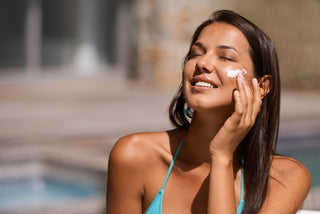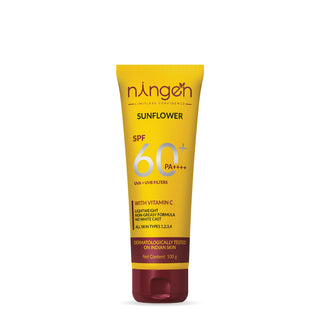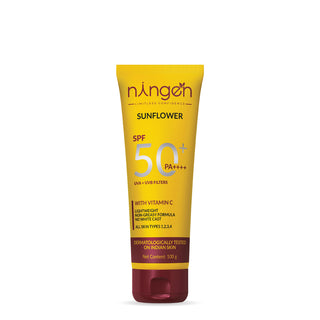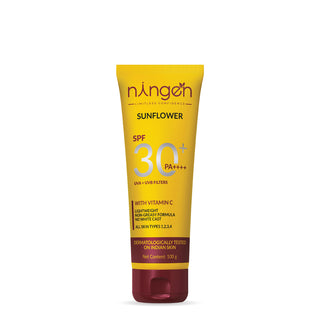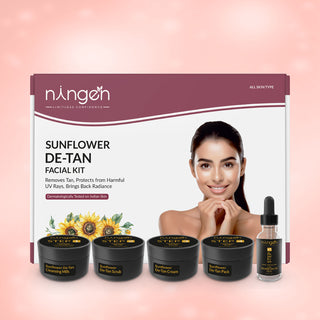SPF 60 sunscreen provides high-level protection against harmful UVA and UVB rays of the sun. Sunscreen is a must-have in everyone’s skincare routine, but are you truly getting the protection your skin deserves? SPF 60 sunscreen may be the ultimate solution for those who want to prevent sun damage and keep their skin looking youthful.
What is SPF 60 Sunscreen?
Sun protection is an essential part of any skincare routine, especially during the summer months. Sunscreen with a high SPF (sun protection factor) is crucial in preventing skin damage caused by harmful UV rays. One such sunscreen is SPF 60, which provides excellent protection against both UVA and UVB rays.
SPF 60 vs SPF 30 vs SPF 50: Which Sunscreen Provides Better Protection?
-
SPF 60
Provides 98% protection from UVB rays, which cause sunburn and contribute to skin problems. This means that if you apply SPF 60 sunscreen properly, it will take 60 times longer for your skin to burn compared to if you were not wearing sunscreen at all. -
SPF 50:
SPF 50 sunscreen Provides 98% protection from UVB rays, just like SPF 60. However, it does not provide as much of a margin of error if you don't apply it properly or if it wears off. -
SPF 30
SPF 30 sunscreen Provides 97% protection from UVB rays, which is slightly less than SPF 50 and SPF 60. However, it is still effective in preventing sunburn and skin damage if applied properly and reapplied as needed.
SPF 60, SPF 50, or SPF 30? It's important to note that there isn't a significant difference between these SPF options in terms of protection. While SPF 60 may provide slightly higher protection than SPF 50 or SPF 30, the difference is negligible. In fact, according to the American Academy of Dermatology, there is only a 1-2% difference in UVB protection between SPF 30 and SPF 50.

SPF 60 Sunscreen: How it Works to Prevent Sun Damage and Premature Aging
SPF 60 sunscreen is a popular choice among people who spend prolonged periods in the sun. With its high level of sun protection, it can effectively prevent sunburn, skin damage, and premature aging caused by harmful UV rays. In this article, we'll explore how SPF 60 sunscreen works to protect your skin, and why it's an essential part of any skincare routine. Whether you have sensitive skin, oily skin, or are looking for a suitable sunscreen for your face, SPF 60 has got you covered.
Prevent Sun Damage
One of the primary functions of SPF 60 sunscreen is to prevent sun damage. The higher the SPF rating, the more protection it offers against harmful UV rays. Sun damage can cause various skin problems such as hyperpigmentation, dark spots, wrinkles, and skin problems. SPF 60 sunscreen provides powerful protection against both UVA and UVB rays that can penetrate the skin and cause damage.
Prevent Premature Aging
Premature aging is another common problem caused by sun exposure. The sun's harmful UV rays break down collagen, which leads to wrinkles, fine lines, and sagging skin. SPF 60 sunscreen helps prevent premature aging by blocking the UV rays that cause collagen breakdown. By using SPF 60 sunscreen daily, you can protect your skin from photoaging and maintain a youthful appearance.
SPF 60 for Face
When it comes to sun protection for the face, SPF 60 is an excellent choice. It provides ample protection against harmful UV rays while being gentle enough to use on the delicate skin on your face. SPF 60 sunscreens are available in various formulations, including lotions, creams, and sprays. If you have sensitive skin, look for a sunscreen that is fragrance-free and hypoallergenic to avoid any irritation.
SPF 60 for Oily Skin
If you have oily or acne-prone skin, choosing the right sunscreen can be tricky. Many sunscreens can clog pores and cause breakouts. However, SPF 60 sunscreen is an excellent choice for oily skin because it's lightweight and oil-free. Look for a sunscreen that is labelled as natural ingredients such as sunflower seed oil to nourish and protect the skin that helps control oil and shine.
SPF 60 Sunscreen for Outdoor Activities
When choosing an SPF 60 sunscreen for outdoor activities, it is important to consider the following factors:
- Water Resistance - If you plan on swimming or participating in water activities, look for a sunscreen that is water-resistant and has a high SPF.
- Sweat-Proof - If you plan on engaging in physical activities like hiking, running, or playing sports, it’s essential to choose a sweat-proof sunscreen that won’t run into your eyes and cause
- Broad-Spectrum Protection - Look for a sunscreen that provides broad-spectrum protection, which means it protects against both UVA and UVB rays.
- Non-Comedogenic - If you have acne-prone skin, look for a non-comedogenic sunscreen that won’t clog your pores.
Sunscreen is an essential to keep our skin safe, and SPF 60 sunscreen is a great choice for those who love outdoor activities.
SPF 60 sunscreen for Sensitive Skin
SPF 60 sunscreen for sensitive skin is formulated with ingredients that are less likely to cause irritation or allergic reactions. These sunscreens are often fragrance-free, oil-free, and hypoallergenic. They may also contain soothing ingredients like aloe vera, chamomile, or oat extract to calm and soothe the skin.
Can I use SPF 60 everyday?
SPF 60 sunscreen can use consistently if you have any desire to shield your skin from sun harm. The American academy of Dermatology suggests utilizing an expansive range of sunscreens with an SPF of 30 or higher on totally uncovered skin, including your face, neck, and hands, consistently, no matter what the climate or season.
SPF 60 gives considerably more security than SPF 30, and that implies that it can assist with forestalling sun-related burns and skin harm all the more successfully. In any case, remember that no sunscreen can give 100 percent security from the sun's unsafe UV beams, it's as yet vital to go to other sun insurance lengths, like looking for conceal, wearing defensive apparel, and staying away from sun openness during top hours.
It's likewise critical to pick a sunscreen that functions admirably for your skin type and inclinations and to apply it appropriately and consistently over the course of the day.
Expert recommendations: Buying SPF 60 Sunscreen for all skin types
Ingredients
When shopping for SPF 60 sunscreen, make sure to read the label carefully. Look for ingredients like sunflower, geranium, wheat germ, and licorice.
Texture
The texture of your sunscreen can make a big difference in how well it works for you. If you have sensitive skin, look for a lightweight and non-greasy formula that won't clog your pores or cause breakouts. A lotion or cream-based sunscreen may work best for those with dry skin, while a gel or spray might be better for oily skin types.
Sunflower
Sunflower oil is an excellent ingredient to look out for in sunscreens. It has natural anti-inflammatory properties that can soothe irritated skin and prevent redness. Additionally, it is rich in antioxidants that can help protect your skin from free radicals.
Geranium
Geranium is another ingredient to consider when choosing a sunscreen for sensitive skin. It has antibacterial and antifungal properties that can help prevent breakouts and fungal infections. Moreover, geranium oil is also known for its ability to balance skin's natural oils, making it a great option for those with oily or combination skin.
Wheat Germ
Wheat germ is a rich source of vitamin E, which is essential for maintaining healthy skin. It helps protect the skin from UV damage and can also improve skin elasticity, making it a great ingredient to look out for in sunscreens.
Liquorice
Liquorice is a natural ingredient that has been used for years in skin care products. It has anti-inflammatory properties and can help soothe irritated skin.
Long-lasting protection: How to apply and reapply SPF 60 sunscreen
Protecting your skin from the harmful rays of the sun is essential, especially if you have sensitive skin. SPF 60 sunscreen offers long-lasting protection and is a great choice for people. However, applying it correctly is crucial to ensure optimal protection against sunburns and premature aging.
- Choose the right product
Before applying SPF 60 sunscreen, it's essential to choose the right product for your skin type.
Ningen Sunflower SPF 60 is a sunscreen product that provides high-level protection against harmful UVA and UVB rays. The product features an SPF rating of 60, making it ideal for people with fair and sensitive skin or those who spend extended periods outdoors.
- Read the Instructions
It is essential to read the instructions on the bottle before use. This will ensure that you are applying the product correctly and getting optimal protection.
- Apply generously
It is crucial to apply sunscreen generously to ensure that you are getting adequate protection. A general rule of thumb is to use about one ounce (or a shot glass full) of sunscreen for your body and a nickel-sized amount for your face. Be sure to apply it on all exposed areas, including your ears, neck, hands, and feet.
- Apply 15-30 minutes before sun exposure
Allow the sunscreen to absorb into your skin before heading outside. This will ensure that it is fully effective when you are exposed to the sun's harmful rays. Apply it at least 15-30 minutes before sun exposure to give it enough time to absorb into your skin.
- Reapply every two hours
Even with long-lasting protection, it's important to reapply your SPF 60 sunscreen every two hours or after sweating or swimming. This will ensure that you are maintaining the level of protection needed to keep your skin safe.
- Use in combination
With other protective measures, SPF 60 sunscreen is just one part of protecting your skin from sun damage. It's important to also wear protective clothing, such as hats and long-sleeved shirts, seek shade during peak sun hours, and avoid tanning beds. Using these measures in combination with SPF 60 sunscreen will give you the best protection against harmful UV rays.
SPF 60 cream is an excellent choice for anyone looking for high-level sun protection for their skin, and it should be an essential part of any sun protection routine


